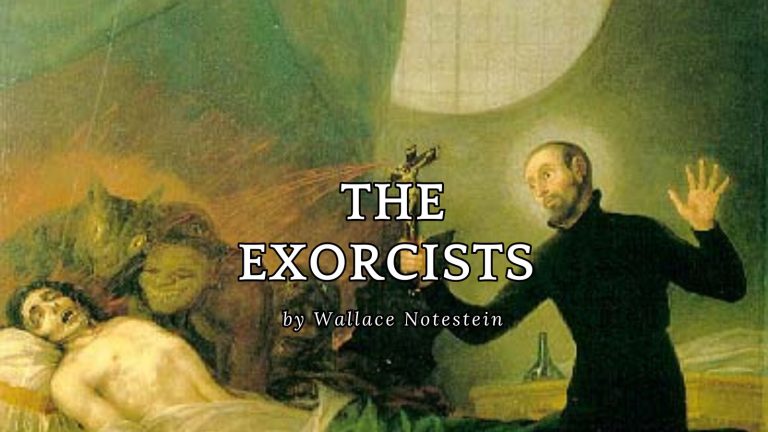 The pretty fable by which the Duchess of Orleans illustrates the character of her son, the regent, might, with little change, be applied to Byron. All the fairies, save one, had been bidden to his cradle. All the gossips had been profuse of their gifts. One had bestowed nobility, another genius, a third beauty. The malignant elf who had been uninvited came last, and, unable to reverse what her sisters had done for their favorite, had mixt up a curse with every blessing.
The pretty fable by which the Duchess of Orleans illustrates the character of her son, the regent, might, with little change, be applied to Byron. All the fairies, save one, had been bidden to his cradle. All the gossips had been profuse of their gifts. One had bestowed nobility, another genius, a third beauty. The malignant elf who had been uninvited came last, and, unable to reverse what her sisters had done for their favorite, had mixt up a curse with every blessing.
He was sprung of a house, ancient indeed and noble, but degraded and impoverished by a series of crimes and follies, which had attained a scandalous publicity. The kinsman whom he succeeded had died poor, and, but for merciful judges, would have died upon the gallows. The young peer had great intellectual powers; yet there was an unsound part in his mind. He had naturally a generous and tender heart; but his temper was irritable and wayward. He had a head which statuaries loved to copy, and a foot the deformity of which the beggars in the street mimicked. Distinguished at once by the strength and by the weakness of his intellect, affectionate yet perverse, a poor lord, and a handsome cripple, he required, if ever man required, the firmest and the most judicious training. But, capriciously as nature had dealt with him, the relative to whom the office of forming his character was entrusted was more capricious still. She passed from paroxysms of rage to paroxysms of fondness. At one time she stifled him with her caresses, at another time she insulted his deformity.
 He came into the world, and the world treated him as his mother treated him—sometimes with kindness, sometimes with severity, never with justice. It indulged him without discrimination, and punished him without discrimination. He was truly a spoilt child; not merely the spoilt child of his parents, but the spoilt child of nature, the spoilt child of fortune, the spoilt child of fame, the spoilt child of society. His first poems were received with a contempt which, feeble as they were, they did not absolutely deserve. The poem which he published on his returns from his travels was, on the other hand, extolled far above its merits. At twenty-four he found himself on the highest pinnacle of literary fame, with Scott, Wordsworth, Southey, and a crowd of other distinguished writers, beneath his feet. There is scarcely an instance in history of so sudden a rise to so dizzy an eminence.
He came into the world, and the world treated him as his mother treated him—sometimes with kindness, sometimes with severity, never with justice. It indulged him without discrimination, and punished him without discrimination. He was truly a spoilt child; not merely the spoilt child of his parents, but the spoilt child of nature, the spoilt child of fortune, the spoilt child of fame, the spoilt child of society. His first poems were received with a contempt which, feeble as they were, they did not absolutely deserve. The poem which he published on his returns from his travels was, on the other hand, extolled far above its merits. At twenty-four he found himself on the highest pinnacle of literary fame, with Scott, Wordsworth, Southey, and a crowd of other distinguished writers, beneath his feet. There is scarcely an instance in history of so sudden a rise to so dizzy an eminence.
Everything that could stimulate, and everything that could gratify the strongest propensibilities of our nature—the gaze of a hundred drawing-rooms, the acclamations of the whole nation, the applause of applauded men, the love of the loveliest women—all this world, and the glory of it, were at once offered to a young man, to whom nature had given violent passions, and whom education had never taught to control them. He lived as many men live who have no similar excuses to plead for his faults. But his countrymen and his countrywomen would love him and admire him. They were resolved to see in his excesses only the flash and outbreak of the same fiery mind which glowed in his poetry. He attacked religion; yet in religious circles his name was mentioned with fondness, and in many religious publications his works were censured with singular tenderness. He lampooned the Prince Regent; yet he could not alienate the Tories. Everything, it seems, was to be forgiven to youth, rank, and genius.
Then came the reaction. Society, capricious in its indignation as it had been capricious in its fondness, flew into a rage with its froward and petted darling. He had been worshiped with an irrational idolatry. He was persecuted with an irrational fury. Much has been written about those unhappy domestic occurrences which decided the fate of his life. Yet nothing ever was positively known to the public but this—that he quarreled with his lady, and that she refused to live with him. There have been hints in abundance, and shrugs and shakings of the head, and “Well, well, we know,” and “We could if we would,” and “If we list to speak,” and “There be that might an they list.” But we are not aware that there is before the world, substantiated by credible, or even by tangible evidence, a single fact indicating that Lord Byron was more to blame than any other man who is on bad terms with his wife. The professional men whom Lady Byron consulted were undoubtedly of the opinion that she ought not to live with her husband. But it is to be remembered that they formed that opinion without hearing both sides. We do not say, we do not mean to insinuate, that Lady Byron was in any respect to blame. We think that those who condemn her on the evidence which is now before the public are as rash as those who condemn her husband. We will not pronounce any judgment; we can not, even in our own minds, form any judgment on a transaction which is so imperfectly known to us. It would have been well if, at the time of the separation, all those who knew as little about the matter then as we know about it now, had shown that forbearance, which, under such circumstances, is but common justice.
We know no spectacle so ridiculous as the British public in one of its periodical lifts of morality. In general, elopements, divorces, and family quarrels pass with little notice. We read the scandal, talk about it for a day, and forget it. But once in six or seven years, our virtue becomes outrageous. We can not suffer the laws of religion and decency to be violated. We must make a stand against vice. We must teach libertines that the English people appreciate the importance of domestic ties. Accordingly, some unfortunate man, in no respect more depraved than hundreds whose offenses have been treated with lenity, is singled out as an expiatory sacrifice. If he has children, they are to be taken from him. If he has a profession, he is to be driven from it. He is cut by the higher orders, and hissed by the lower. He is, in truth, a sort of whipping-boy, by whose vicarious agonies all the other transgressors of the same class are, it is supposed, sufficiently chastised. We reflect very complacently on our own severity, and compare with great pride the high standard of morals established in England, with the Parisian laxity. At length our anger is satiated. Our victim is ruined and heart-broken. And our virtue goes quietly to sleep for seven years more.
It is clear that those vices which destroy domestic happiness ought to be as much as possible represt. It is equally clear that they can not be represt by penal legislation. It is therefore right and desirable that public opinion should be directed against them. But it should be directed against them uniformly, steadily, and temperately, not by sudden fits and starts. There should be one weight and one measure. Declamation is always an objectionable mode of punishment. It is the resource of judges too indolent and hasty to investigate facts, and to discriminate nicely between shades of guilt. It is an irrational practise, even when adopted by military tribunals. When adopted by the tribunal of public opinion, it is infinitely more irrational. It is good that a certain portion of disgrace should constantly attend on certain bad actions. But it is not good that the offenders merely have to stand the risks of a lottery of infamy that ninety-nine out of every hundred should escape; and that the hundredth, perhaps the most innocent of the hundred, should pay for all….
We can not even now retrace those events without feeling something of what was felt by the nation when it was first known that the grave had closed over so much sorrow and so much glory—something of what was felt by those who saw the hearse, with its long train of coaches, turn slowly northward, leaving behind it that cemetery, which had been consecrated by the dust of so many great poets, but of which the doors were closed against all that remained of Byron. We well remember that, on that day, rigid moralists could not refrain from weeping for one so young, so illustrious, so unhappy, gifted with such rare gifts and tried by such strong temptations. It is unnecessary to make any reflections. The history carries its moral with it. Our age has indeed been fruitful of warnings to the eminent, and of consolation to the obscure. Two men have died within our recollection, who at a time of life at which few people have completed their education, had raised themselves, each in his own department, to the height of glory. One of them died at Longwood, the other at Missolonghi.
Born in 1800, died in 1859; educated at Cambridge; admitted to the bar in 1826; member of Parliament, 1830-34; member of the Supreme Council in India, 1834-38; member of Parliament, 1839-47; Secretary of War, 1839-41; paymaster-general, 1846-47; again in Parliament in 1852; raised to the peerage in 1857; his “History of England” published in 1848-61; his “Lays of Ancient Rome” in 1842.
- 8 Authors Who Created Literary Masterpieces Keeping Their Day Jobs - March 31, 2025
- Plotter or Pantser? A Writer’s Personality Quiz - March 30, 2025
- 100 Must-Try Mystery Writing Prompts (Solve the Perfect Crime!) - March 22, 2025






